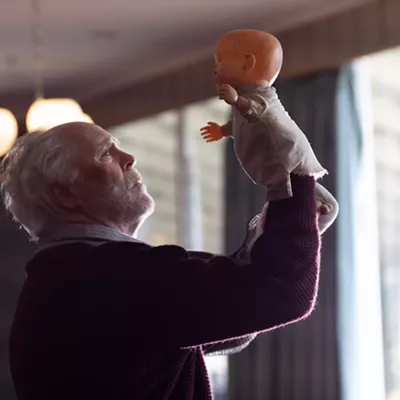For a film hell-bent on placing itself in conversation with the history of both Hollywood and cinema itself, it's almost remarkable how little Ti West's MaXXXine actually has to say. Alas, it's an empty pastiche with no emotional potency or true panache. There are movie references galore, but almost nothing going on underneath all of them. Even as it flirts with what could be more fearsome fun or gestures toward teasing out potentially gruesome gags, it mostly drags, one slight scene bleeding into the next until a painfully telegraphed "twist" lands flat on its face.
The undercurrent in X and Pearl, the vastly superior first two parts of West's horror trilogy, was finding fame. No matter the cost, the characters all wanted to be stars on the silver screen. In this lackluster final chapter, which West again writes and directs, Mia Goth's Maxine Minx may be on the cusp of this stardom, but she somehow feels more inert than ever before. Save for an early moment where she turns the tables on what could have been a bad situation and squashes the balls of a brutish Buster Keaton look-alike, this is a film with no teeth to speak of. It's watchable but wearisome, proving to be a hollow assembly of occasionally stylish scenes that are still neither consistently humorous nor horrifying enough to leave a memorable mark.
This all kicks off with Maxine going to an audition for a big horror sequel, "The Puritan II," which she hopes will be her big break in 1980s Hollywood. She gets the part and is taken under the wing of the director Elizabeth Bender, played by an underutilized Elizabeth Debicki (Tenet), who waxes poetic about cinema and commerce though mostly fades into the background of her own film. The real star of the show remains Maxine, but a more oddly muted Goth doesn't make much of this. Instead, she's haunted by the infamous "Texas porn star massacre" of X. While Tobe Hooper's enduring masterpiece The Texas Chain Saw Massacre was referenced in the prior films, this time you'll just wish that you were watching it over whatever is playing out here.
Where X was a bloody blast, this film uses its events to give Maxine underdeveloped trauma that grows tiresome. Even as she escaped, she remains fearful that this past could come knocking. Knock it does in the form of a cartoonish private eye who is played by an obnoxious Kevin Bacon. Looking like Jack Nicholson's classic character in Chinatown (though with none of the screen presence), he starts to bother Maxine at the behest of a shadowy figure with a bone to pick. If you find yourself ultimately surprised by who this ends up being, I have a bridge to sell you.
There is some chatter about the Night Stalker, with the eerie dread of David Fincher's Zodiac looming large over this narrative, but it soon becomes clear that West has no real interest in exploring the fear of serial killers with any purpose. We pop over for a couple of visits to the set of Alfred Hitchcock's Psycho, but this again just reminds of a better, more menacing movie you'd rather watch than this one. Not only are all the films MaXXXine references more well-crafted than it ever is, but they stood on their own and cut into distinct ideas. Not only is there no new ground to be found here, but any vibrancy it taps into visually gets smothered under the shadow of the superior works that preceded it. Both X and Pearl had something more going on even as they wore their influences on their sleeves, MaXXXine does not. It merely coasts along.
When the climax pulls back the curtain on all of this, the film falls apart before our eyes. Even as a closing shot and line brings with it a melancholic resonance, none of these themes were explored in any meaningful way leading up to the finale. MaXXXine may find the fame its titular character desperately craves, but the cost of doing so was recreating an empty vision of Hollywood all its own. Its biggest twist is that the creatively bankrupt call was coming from inside the house all along.























